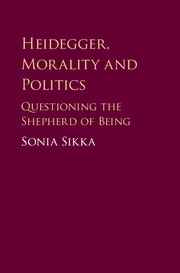Book contents
- Heidegger, Morality and Politics
- Heidegger, Morality and Politics
- Copyright page
- Contents
- Acknowledgments
- Note on Citations
- Abbreviations
- Introduction
- 1 Freedom and Necessity
- 2 Is Humanity an End in Itself?
- 3 Animals and Other Beings
- 4 Justice in Light of the Good
- 5 Cultures, Peoples, Nations
- 6 Was Heidegger Racist?
- 7 The Status of Reason
- Conclusion
- Bibliography
- Index
- References
Bibliography
Published online by Cambridge University Press: 07 December 2017
- Heidegger, Morality and Politics
- Heidegger, Morality and Politics
- Copyright page
- Contents
- Acknowledgments
- Note on Citations
- Abbreviations
- Introduction
- 1 Freedom and Necessity
- 2 Is Humanity an End in Itself?
- 3 Animals and Other Beings
- 4 Justice in Light of the Good
- 5 Cultures, Peoples, Nations
- 6 Was Heidegger Racist?
- 7 The Status of Reason
- Conclusion
- Bibliography
- Index
- References
- Type
- Chapter
- Information
- Heidegger, Morality and PoliticsQuestioning the Shepherd of Being, pp. 221 - 234Publisher: Cambridge University PressPrint publication year: 2017

